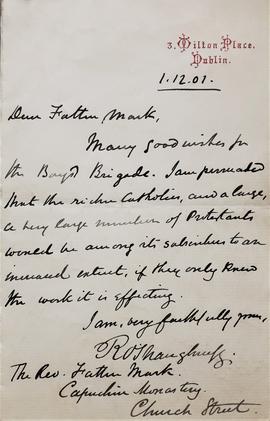- IE CA CS/2/2/6/5
- File
- 3 July 1888-16 Nov. 1888
Part of Irish Capuchin Archives
Draft assignment of Mary Craven, widow of Philip Craven, 141 Church Street, James Keogh, 35 Fontenoy Street, Bridget Keogh, his wife, and Elizabeth Kelly, spinster, to Fr. William (Paul) Neary OSFC, Fr. Nicholas Murphy OSFC and Fr. Patrick Joseph (Columbus) Maher OSFC, Presbytery, Church Street, of the residue of the abovementioned lease (24 June 1858) of the properties known as nos. 2 and 3 Thunder’s Court situated at the rear of 141 Church Street, in consideration of the sum of £225. The assignment also conveys the residue of the lease (13 Aug. 1866) of the premises known as 141 Church Street. (See CA CS/2/2/6/1 and CA CS/2/2/6/3). The title page is endorsed ‘for the approval on behalf of the parties of the 1st part of P.J. Kelly, Esq.’. The file also includes:
• Instructions submitted to Philip White, barrister, for advice on title to the aforementioned properties and for settling the said draft assignment. 16 Nov. 1888.
• Declaration of Mary Craven, Bridget Keogh and Elizabeth Kelly in respect of title to 141 Church Street. 27 July 1888.
• Rental of 141 Church Street and associated properties (2-3 Thunder’s Court) referred to in the declaration of Mary Craven and others.
• Copy draft request for searches in the Registry of Deeds relating to registered deeds of title affecting the said properties and aforementioned vendors. 26 July 1888.
• Requisitions on title relating to the draft assignment of the aforementioned properties. The requisitions relate to questionable points of title which were raised by the purchasers’ solicitors and barristers for comment and resolution. 3 July 1888.
• Municipal Rates’ receipts.

